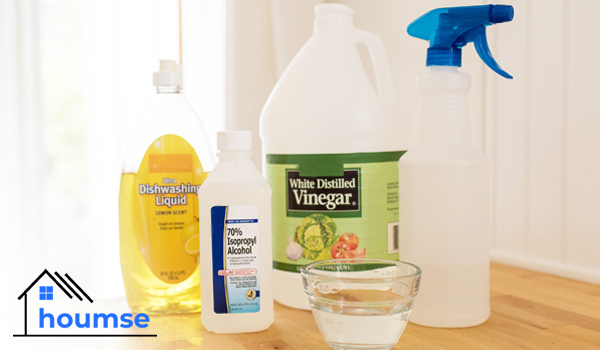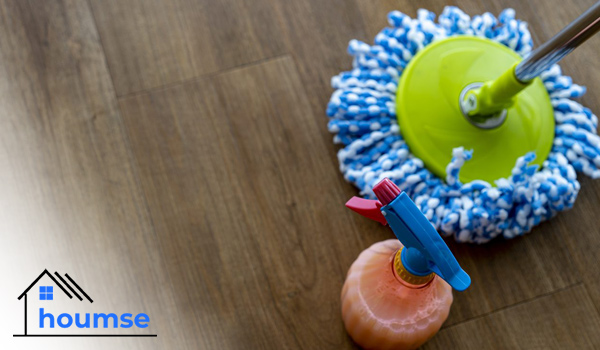How To Clean Vinyl Floors (with 5 DIY Cleaners)

If you have the right vinyl floor cleaner, cleaning these flooring may be easier than you think. However, using the wrong cleaner may compromise the shiny and delicate vinyl scratching it and making it dull.
To make things easier, you can buy a steam mop or a commercial cleaner. But what if you do not own a fancy steam mop (that may actually damage the flooring in the long term)? Or, you do not have the desire to pollute the environment using chemical vinyl floor cleaners?
If that is the case, keep reading this article to see how to clean vinyl floors using 5 effective home remedies and avoid common mistakes while maintaining such floorings.
DIY Vinyl Floor Cleaner
In this part, we are going to introduce some of the best vinyl floor cleaners that you can prepare at home and use to clean the floor. All these household cleaners are safe and environmentally friendly, as well as effective at removing any soil.
Just remember that the correct cleaning process does not begin with using a vinyl floor cleaner. First, vacuum the floor or dry mop. This will remove any dirt, hair, and dust from the surface. This is an essential step before proceeding with applying the cleaner damp mopping.
Vinegar and Alcohol
Vinyl flooring is delicate and easily scratched. Therefore, a vinegar and alcohol solution is the best way to clean vinyl floors.
To make this DIY cleaner, mix half a cup of vinegar, alcohol, a few drops of detergent, and two gallons of water. The detergent will help in removing residue and stubborn stains.
How to clean vinyl floors using this mixture? Apply the solution to the floor. Then mop the surface thoroughly but gently. Finally, wipe the vinyl floor using a clean mop and water.
Hot Water and Vinegar
Another effective DIY vinyl floor cleaner to remove dirt, stains, and blemishes from the surface is using vinegar and hot water. The acid in the vinegar helps remove the toughest spots from your floors. Additionally, it does not leave any residue and does not damage the finish.
To make a solution, pour a gallon of water and a cup of vinegar into a bucket. Then dampen a soft cloth and gently sweep the surface. Then clean the surface with a clean, damp cloth or mop. To dry the floor, you can use a blow dryer or a microfiber cloth. A dry mop is a better choice, sometimes using vacuum cleaners leaves a mark on the finish.

Baking Soda Paste
Are the challenging stains and you do not know how to clean vinyl floors? Do not worry, there may be a trustworthy, effortlessly, and safe solution to deal with hard-to-remove stains: applying baking soda paste.
To prepare this DIY vinyl floor cleaner, make a thick paste by mixing a little water with a cup of baking soda (scale the amounts accordingly if more is needed). Then use a soft cloth to apply the paste onto the area. Let the paste stay on the for a few minutes. After this time, use a microfiber cloth to scrub the floor. Then clean the floor using a clean mop or cloth dampened with warm water.
Dishwashing Soap
Dishwashing soap is another best way to clean vinyl floors. First, mix a bucket of warm water and a few teaspoons of dish soap. Next, use the solution to mop the floor.
Interestingly, using this solution for regular maintenance prevents difficult stains to form. Because of this, we recommend that you try dishwashing soap as your regular vinyl floor cleaner. It is gentle on delicate surfaces and safe to use.
Dishwashing Soap, Vinegar, and Baby Oil
This may be the best vinyl floor cleaner, especially if the floor requires thorough cleaning. To prepare this powerful cleaning agent, mix one cup of white vinegar, a good amount of dishwashing liquid and baby oil, and a gallon of hot water.
This is the perfect vinyl floor cleaner for a surface that has not been cleaned for a long time) or high-traffic areas at your home.
Best Way to Clean Vinyl Floors: Special Stains
The DIY cleaners that we discussed are suitable for weekly cleaning. However, it is better to treat stains immediately, for example, clean stains by hand with a nylon cloth and neutral detergent. Wipe from the outside of the stain toward its center, then rinse the spot with a clean cloth and cold water.
- Oil or Lemon: remove these immediately as they can cause discoloration on the surface of your vinyl floor.
- Ink, Tomato, or Blood: These stains can be removed by applying very diluted alcohol directly on the stain and leaving it for a few minutes, then rinse with water.
- Marker Stains: These are easily cleaned by rubbing a little white alcohol on a cloth and whipping well with a damp cloth.

How to Clean Vinyl Floors: Tips
- Avoid scrubbing too hard, as this will take the shine off the vinyl floor.
- Avoid having furniture with wheels because they will leave marks on the floor.
- Place protective pads such as felt under heavy furniture, chair, and table legs
- Keep heat sources such as heaters at a safe distance/height for your vinyl floor.
- Never use a knife to remove dried substances that have stuck to the floor. This will leave a permanent mark.
- Clean the floors with natural, mild, or neutral detergents like the DIY vinyl floor cleaners introduces earlier.
- Do not let the vinyl floor get too wet, this will damage the glue under the vinyl. If something spills, be sure to wipe it up quickly.
- Use doormats at entrances to prevent dirt or dust from getting inside and make cleaning easier. Around 80% of dirt comes from outside!
- To minimize the use of vinyl floor cleaners, you may want to use rugs in high-traffic areas of your home. Use non-staining polypropylene rugs, woven colorfast rugs, or vinyl-backed rugs. We do not recommend using rubber or latex-backed mats as they can cause discoloration.
Worst Vinyl Floor Cleaners
It is good to know the best way to clean vinyl floors and suitable cleaners. Meanwhile, it is also beneficial to know what to avoid. With that in mind, do not clean a vinyl floor with:
- Acetone or solvents
- Ammonia or bleach
- Oil-based products
- Abrasive powders
- Steam cleaners
- Wax or varnish
- Black soap
- In this post:
- DIY Vinyl Floor Cleaner
- Best Way to Clean Vinyl Floors: Special Stains
- How to Clean Vinyl Floors: Tips
- Worst Vinyl Floor Cleaners



